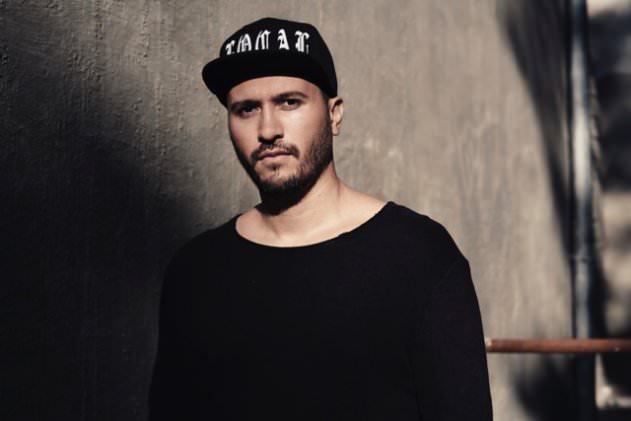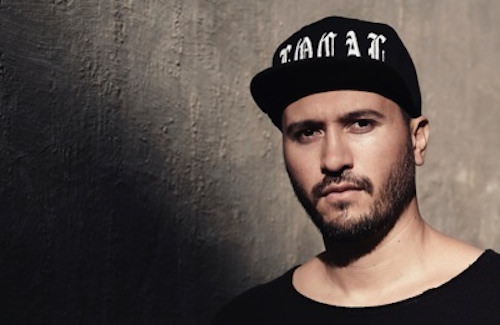Raised in Mexico and now resident in LA after spells in London and Berlin, Hector Murillo is a hard man to pin down. Kristan J Caryl called him in Japan to discuss gangs, flyering and Justin Bieber.

Hector has come up in old-school fashion: rather than ever releasing a massive hit, he has slowly but surely risen though the ranks from poster boy to Fabric headliner. After initially getting the bug back home in his native Mexico (thanks to visiting sets from the likes of Moodymann) he began spinning records aged 16. The more he learned about the electronic world, though, the more the lure of London grew irresistible and so, aged 19, he upped and left for the UK capital.
A lot has happened since, from jobs in Phonica to having all his records stolen, via friendships with Loco Dice and handshakes with Justin Bieber in Space Ibiza. The upshot of all that is he now has a healthy discography that takes in moody and spacious minimal, house and techno tracks on labels like Tsuba, Desolat and Inmotion. Ahead of returning to play at his home from home, Fabric
, we quizzed the amiable LA-based Mexican about gangs, flyering in Ibiza and his soon to be launched label, clothing range and event brand…
Attack: Where are you at the moment?
Hector: Tokyo, Japan. I played last weekend and stayed for a week. I go every year. It’s my favourite city in the world. The clubs, the technology, it’s amazing. Every club has an amazing sound system, the equipment is mint and there are never any problems there.
most of my tracks start from zero. Some producers have a folder with their favourite clap, kick drum, snare – I always start from zero and use whatever I feel in that moment.
Does that environment suit you? Or do you prefer a basement or a warehouse?
It depends. I have music to play in all sorts of places. I do like small warehouses and basements, as that’s where I started in London in Kubicle, but also I love Fabric, Warung in Brazil, Womb in Tokyo, the Amnesia Terrace. But I also play Timewarp, Mysteryland – those are also really good. I don’t think I have a favourite, I like playing all of them.
When you make music do you have any of these environments in mind?
Not really, because most of my tracks start from zero. Some producers have a folder with their favourite clap, kick drum, snare – I always start from zero and use whatever I feel in that moment. Sometimes I think, “This will sound great in that club, it’s so warm,” but really it depends on my mood.
I’ve always been like that: from day one to now, every EP is different. My previous EP sold out and Carl Cox, Adam Beyer, Nicole Moudaber all played it, but my latest one is more underground – parties like Fuse, DJs like tINI and the gang, they all play it, so I have a good balance. It’s completely different from release to release.
Do you release as often as you want, generally only a couple of times a year? Maybe it takes you longer on each track because of your ground-up approach?
No, no, no, this is the whole plan. I don’t like to release so many in one year because it would be saturating. I like to be selective on stuff I’m really happy to put out. Every year I go back and do a Tsuba EP – you can see that they’re never the same sound, and that the label gives me the chance to explore and do something new. One thing is that all my EPs need to be on vinyl – none of my EPs are digital, only remixes.
Did moving to Berlin from London affect your sound?
I think since I started to like electronic music my influences have been more from the UK: from tech-house to techno, it all came from when I was based in the UK. When I came to Berlin it was more to get out of the hectic life in London. I started to travel more, so I couldn’t work in Phonica any more. It was always very hard to leave to London, to get to the airport, missing trains then being stuck and stuff. In Berlin it’s easier, cheaper, there are different kinds of clubs and the music is different so I pick some stuff I like but I don’t think the city influenced my style of music at all. I loved it there but for reasons other than music.
So that UK influence, were you into electronic music before hitting English shores?
Yeah, that’s how I got to know about Fabric, The End, compilation series, DJs like Terry Francis and Craig Richards. I moved to London at 19 just to try my luck for three months, but after seeing all these clubs for real it gave me a completely different perspective. So I started working in a bar so I could study sound engineering. I never went home. I stayed there for 11 years.
Did you start DJing immediately in London?
No, it took me a long time, working and saving money. I used to go to the record shops in Soho and buy vinyl, but I didn’t have decks, sound system or a mixer at home, so I started collecting then eventually bought my first decks, which I still have. From there I started playing friends’ birthday parties and stuff, but I’m so happy to have started with nothing and built up from the bottom. I’m so happy and grateful I started from zero. To get money I was putting up posters, giving out flyers, giving CDs to DJs. It made me realise how it all really started back in the day – everything was done in person, people came with boxes full of promo CDs and stuff and so I felt lucky to be part of that era. It was really good, because since the digital era all the industry changed. To go to the record shop and finally get the one you wanted, to touch the cover, it was a great feeling you don’t get with digital.
I moved to London at 19 just to try my luck for three months. I never went home. I stayed there for 11 years.
I guess that’s why you wanted to work at Phonica, then?
It was everyone’s dream to work in one of the best record shops. To see people like Richie Hawtin, Francois K, Massive Attack and Bjork all turn up in the shop was amazing.
So did you give those guys recommendations or did they know what they were looking for?
At the end, once I’d done my research and learned on the job, yes. New records, artists and labels arrived every day and you listened to them all. To have people like Craig Richards, who plays weird stuff, come in – I know what he likes, I know what I could give to him, or to Mr C, or Luciano. I was learning every day.

04.32 PM
He comes across as a genuine guy. Nice interview.